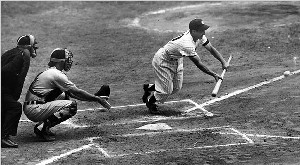
| |
| Home |
| Project Description |
| Project Overview |
| Downloads |
| Journal |
| About Me |
| Project Description | ||
Project Details The goal of the project is to write a program to create, maintain, simulate, and report data for fictional baseball leagues for the purpose of economic research and study. Given a selection of players with varying performance statistics, a user should be able to create a league, set the parameters or rules of the league, fill it with a certain amount of teams containing a certain amount of players, and adjust the “focus” or philosophy of each team, whether it is profit maximization or winning. Teams should also have a philosophy for signing players in terms of statistics or performance measures they emphasize. With the various “philosophies” in place, the program should fill team rosters within the criteria set by the teams and league, along with a bit of randomness. Once the teams are created, a user should be able to simulate seasons for the league, generating results with appropriate team and player statistics, along with financial data. Lastly, the user should be able to gather the results of the simulation for the purpose of study, hence summary data, such as competitive balance, average salary; etc should be available either readily or as a computation. The user should be able to alter the parameters of a league or team between simulations, as well as manage more than one league at a time. With such a software package available, a researcher will be able to run hundreds of simulations for various league and team structures, resulting in a breadth of data that is both random, yet stochastic enough to be of value in testing economic theories. |
Required Reading
|

